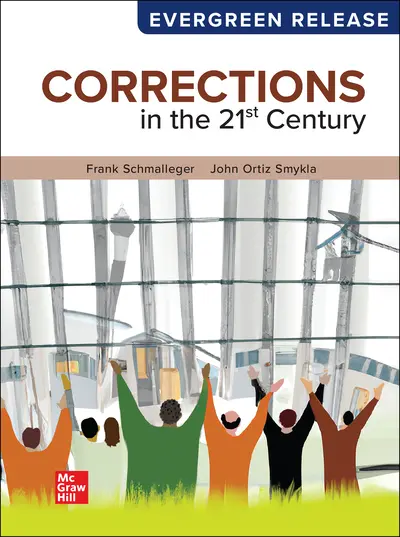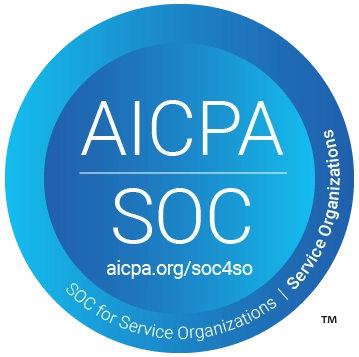My Account Details


Corrections In The 21St Century: 2024 Release
Format Options:
-
Lowest Price!
eBook from $57.33 -
Print from $70.00 -
Connect from $100.10
McGraw Hill eBook
Textbook Rental (150 Days Access)
- Rent for a fraction of the printed textbook price
- Complete text bound in hardcover or softcover
Loose-Leaf Purchase
Unbound loose-leaf version of full text
Shipping Options
- Standard
- Next-day air
- 2nd-day air
Orders within the United States are shipped via FedEx or UPS Ground. For shipments to locations outside of the U.S., only standard shipping is available. All shipping options assume the product is available and that processing an order takes 24 to 48 hours prior to shipping.
Note: Connect can only be used if assigned by your instructor.
Connect (180 Days Access)
- Digital access to a comprehensive online learning platform
- Includes homework, study tools, eBook, and adaptive assignments
- Download the free ReadAnywhere app to access the eBook offline
Connect + Loose-Leaf
- Comprehensive online learning platform + unbound loose-leaf print text package
- Connect includes homework, study tools, eBook, and adaptive assignments
- Download the free ReadAnywhere app to access the eBook offline
Shipping Options
- Standard
- Next-day air
- 2nd-day air
Orders within the United States are shipped via FedEx or UPS Ground. For shipments to locations outside of the U.S., only standard shipping is available. All shipping options assume the product is available and that processing an order takes 24 to 48 hours prior to shipping.
* The estimated amount of time this product will be on the market is based on a number of factors, including faculty input to instructional design and the prior revision cycle and updates to academic research-which typically results in a revision cycle ranging from every two to four years for this product. Pricing subject to change at any time.
Instructor Information
Quick Actions (Only for Validated Instructor Accounts):
Corrections in the 21st Century builds on the twin themes of evidence-based corrections and professionalism in corrections. Corrections professionalism has garnered support from policymakers and respect from the public. Building on these critical foundations, the text examines contemporary real-world correctional practice, explores opportunities represented by new and developing corrections technologies, and points the students in the direction of the still-emerging ideal of corrections professionalism to equip them with the career skills needed to succeed in the field today. There is a thorough description of both traditional and progressive correctional ideology and a comprehensive overview of correctional practice, paired with a focus on the development of personal and social skills applicable to the corrections field.
A foreword by Ryan Thornell, Director of the Arizona Department of Corrections, Rehabilitation, and Reentry, provides a thought-provoking introduction to the text.
1 Corrections: An Overview
2 Corrections Today: Evidence-Based Corrections and Professionalism
3 Sentencing: To Punish or to Reform?
PART 2 COMMUNITY CORRECTIONS
4 Probation: The Most Used Form of Punishment
5 Intermediate Sanctions and Community Corrections: Between Probation
and Incarceration
PART 3 INSTITUTIONAL CORRECTIONS
6 Jails: Front Door to Corrections
7 Prisons Today: Change Stations or Warehouses?
8 Parole: Early Release and Reentry
PART 4 THE PRISON WORLD
9 The Staff World: Managing the Prison Population
10 The Client: Living Behind Bars
11 The Legal World: Prisoners’ Rights
12 Special Prison Populations: People in Prison With Substance Use Disorders, HIV/AIDS, Mental Illness, and the Elderly
Main Features
- LMS Integration
- Print/Loose-Leaf Book Add-On Availability
- Presentation Slides & Instructor Resources
- Question & Test Banks
- Adaptive Assignments
- Student Progress Reporting & Analytics
- Essay Prompts
- Polling
- Prebuilt Courses
- Interactive Exercises
- eBook Access (ReadAnywhere App)
- Remote Proctoring (Proctorio)
- Subject-Specific Tools
About the Author
Frank Schmalleger
Frank Schmalleger, PhD, is Distinguished Professor Emeritus atthe University of North Carolina at Pembroke. Dr. Schmalleger holds a bachelor’s degree from the University of Notre Dame and both a master’s and a doctorate in sociology from The Ohio State University with a special emphasis in criminology. From 1976 to 1994, he taught criminal justice courses at the University of North Carolina at Pembroke, serving for many years as a tenured full professor. For the last 16 of those years, he chaired the Department of Sociology, Social Work, and Criminal Justice. As an adjunct professor with Webster University in St. Louis, Missouri, Dr. Schmalleger helped develop a graduate program in security management and loss prevention that is currently offered on U.S. military bases around the world. He taught courses in that curriculum for more than a decade, focusing primarily on computer and information security. Dr. Schmalleger also has taught in the New School for Social Research online graduate program, helping build the world’s first electronic classrooms for criminal justice distance learning.
Dr. Schmalleger is the author of numerous articles and many books, including Criminal Justice Today (Prentice Hall, 2021), Criminal Justice: A Brief Introduction (Prentice Hall, 2020),Criminology Today (Prentice Hall, 2021), and Criminal Law Today (Prentice Hall,2016). He is founding editor of the journal Criminal Justice Studies (formerly The Justice Professional) and has served as imprint advisor for Greenwood Publishing Group’s criminal justice reference series.
Dr.Schmalleger is also the creator of a number of award-winning websites (including the former cybrary.info and crimenews.info). He is a member of the Academy of Criminal Justice Sciences, the American Society of Criminology, and the Society of Police Futurists International (where he is a founding member). Schmalleger’s author page on Amazon. com can be viewed atamazon.com/author/frankschmalleger. Follow him on Twitter @schmalleger.
John Smykla
John Ortiz Smykla, PhD, is retired director and professor of the School of Criminology and Criminal Justice at Florida Atlantic University. He also held appointments at the University of Alabama, where he served as professor and chair of the Department of Criminal Justice; the University of South Alabama, where he served as professor and chair of the Department of Political Science and Criminal Justice; and the University of West Florida,where he served as professor and chair of the Department of Criminal Justice and Legal Studies and was named Distinguished University Professor. He earned the interdisciplinary social science PhD in criminal justice, sociology, and anthropology from Michigan State University. He holds bachelor’s and master’s degrees in sociology from California State University at Northridge.
Dr. Smykla has authored or edited five corrections books, including Probation, Parole, and Community Based Corrections (2013) and Offender Reentry: Rethinking Criminology and Criminal Justice (2014). His coauthored data set Executions in the United States, 1608–2003: The Espy File, funded by a grant from the National Science Foundation, is one of the most frequently requested criminal justice data files from the University of Michigan’s Inter- University Consortium for Political and Social Research.
Dr. Smykla has published more than 75 research articles on corrections and policing issues. He recently completed a multiyear analysis of federal reentry court and the impact of police body cameras.
In 1986, Dr. Smykla was a Senior Fulbright Scholar in Argentina and Uruguay. He is a member of the Academy of Criminal Justice Sciences and the Southern Criminal Justice Association.In 1996, the Southern Criminal Justice Association named him Educator of the Year. In 1997, he served as program chair for the annual meeting of the Academy of Criminal Justice Sciences. In 2000, he served as president of the Southern Criminal Justice Association. In 2017, Dr. Smykla and his colleagues received Springer’s Outstanding American Journal of Criminal Justice Article Award for their research on police body cameras, and in the same year, another of their articles on police body cameras was named Most Read in Criminal Justice and Behavior. He was inducted into the Michigan State University School of Criminal Justice Wall of Fame in 2019.
Accessibility
Creating accessible products is a priority for McGraw Hill. We make accessibility and adhering to WCAG AA guidelines a part of our day-to-day development efforts and product roadmaps.
For more information, visit our accessibility page, or contact us at accessibility@mheducation.com
Affordability
Reduce course material costs for your students while still providing full access to everything they need to be successful. It isn't too good to be true - it's Inclusive Access.
Need support? We're here to help - Get real-world support and resources every step of the way.

